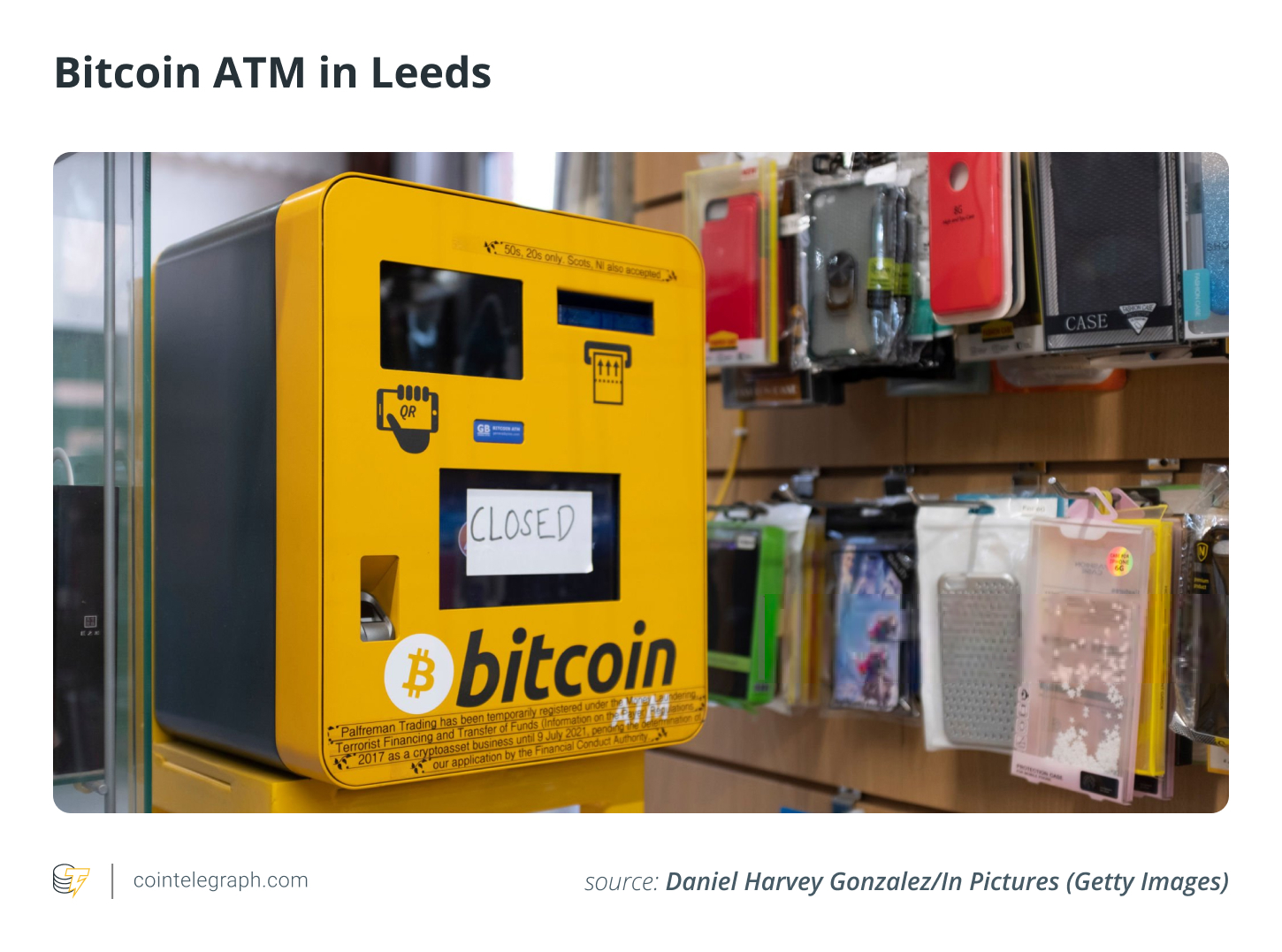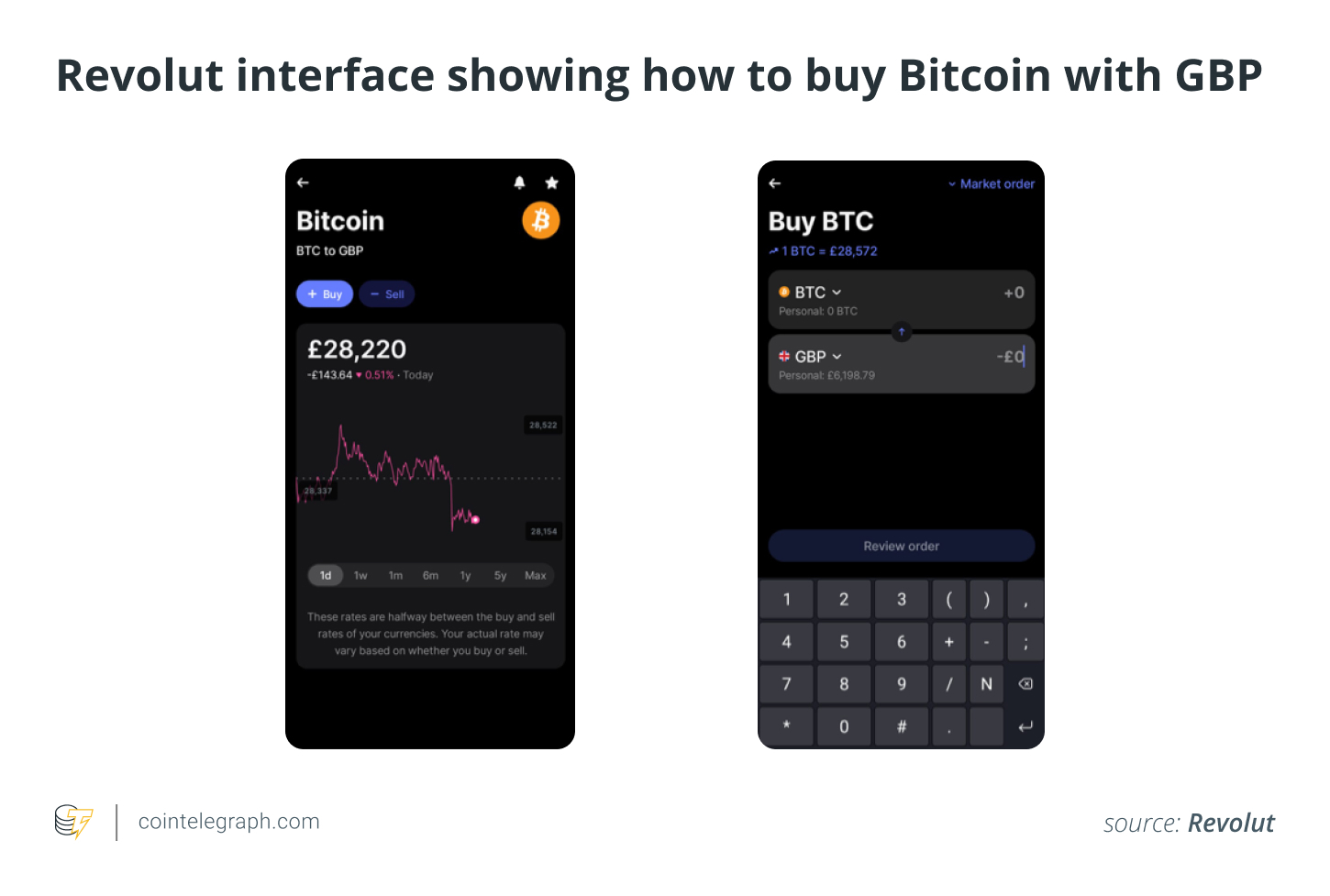
How to buy Bitcoin and Ethereum in the UK

Buy Bitcoin and Ether legally and securely in the U.K. and get insights on regulations, storage and investment options to make informed decisions.
To navigate the process of buying Bitcoin effectively, it is essential to explore secure options. In the United Kingdom, acquiring cryptocurrencies is legal, yet it can pose challenges, as the government underscores the need to comprehend the associated risks.
For an effective traversal of the crypto landscape, investors should follow key steps, including choosing the right crypto exchange or broker, setting up a secure wallet and making informed decisions regarding payments and orders.
This article examines how to purchase Bitcoin (BTC) and Ether (ETH) in the U.K. while offering information on legal considerations, secure storage options, cryptocurrency exchanges and brokers for effortless market navigation.
Is it legal to buy Bitcoin and Ether in the U.K.?
While the legal status of cryptocurrencies varies from one country to another, buying Bitcoin (BTC) and Ether (ETH) is entirely legal in the U.K., with a well-defined regulatory framework in place. Cryptocurrencies are categorized as taxable assets by His Majesty’s Revenue and Customs (HMRC), and they are subject to taxation.
Acquiring Bitcoin and Ether in the U.K. triggers the tax reporting and payment obligations associated with cryptocurrency transactions. As such, maintaining accurate records is crucial for individuals planning to purchase BTC and ETH in the United Kingdom. This ensures compliance with tax regulations for both crypto gains and crypto losses.
It’s important to note that in the U.K., cryptocurrencies are not recognized as legal tender like the British pound. This regulatory approach to cryptocurrencies helps to foster innovation and promote awareness of associated risks, creating a transparent, legal environment for buying, selling and holding Bitcoin and Ether.
In October 2023, the Financial Conduct Authority (FCA) expanded its regulatory oversight to include crypto asset promotions in the U.K., emphasizing compliance with accurate information and risk warnings. Additionally, starting in September 2023, the Travel Rule mandates that U.K.-based crypto asset businesses are required to collect, verify and share information on transfers, which impacts the pseudonymous nature of cryptocurrencies.
Despite industry engagement, some market players have exited the U.K., highlighting the importance of adhering to rules and regulations when using exchanges to buy cryptocurrencies.
Secure wallet practices to safeguard Bitcoin and Ether holdings
Prior to delving into Bitcoin and Ether investments, it’s essential to have a secure crypto wallet, available in various forms. While leaving holdings on an exchange account is convenient for small quantities, transitioning to a more secure storage solution can be an option for those investors who want to store larger amounts of tokens.
Moreover, it’s crucial to remember that retaining funds on an exchange means lacking control over the keys and, consequently, forfeiting control over the coins, emphasizing the importance of securing private keys for the full control and ownership of digital assets.
Bitcoin wallets, including hardware, software and paper options, are used to securely manage and store Bitcoin holdings, while Ethereum wallets act as secure repositories for ETH, providing control over assets and facilitating transactions.
Cryptocurrency users rely on Bitcoin and Ether wallets to safeguard and control their digital assets, ensuring the secure management of private keys essential for accessing and managing their holdings.
Related: A beginner’s guide to filing cryptocurrency taxes in the US, UK and Germany
To reduce risk, an investor can enhance security by transferring their cryptocurrency from an exchange’s default wallet to their own cold wallet, which is not online and thus less susceptible to hacking.
It’s worth noting that these wallets don’t store investor’s cryptocurrencies per se; instead, they safeguard the private keys necessary for accessing the wallet’s address and authorizing transactions. Losing these digital keys means forfeiting access to Bitcoin and Ether holdings.
Buying Bitcoin and Ether in the U.K. through crypto exchanges
Investors need to choose a broker or cryptocurrency exchange before they can purchase cryptocurrencies. Although both enable cryptocurrency purchases in the U.K., it’s important to note some significant distinctions between them. Due to the growing possibility of hacks in the cryptocurrency space, choosing the best cryptocurrency exchange or broker can be a challenging process, with security being the main priority.
Choose a crypto exchange
In the U.K., crypto assets and crypto exchanges operate without formal regulation, but the Financial Conduct Authority (FCA) mandates registration for crypto exchanges within the country. Notably, some crypto exchanges such as Gemini, Bitpanda, Kraken and Crypto.com are successfully registered with the FCA.
Given the extreme volatility and absence of government-backed protection for cryptocurrency investments, exercising caution and acknowledging the speculative nature of cryptocurrencies is vital, even when dealing with FCA-authorized and regulated providers. To enhance security, an investor can also diversify their digital currency holdings across multiple exchanges to mitigate the risk of a single exchange failure.
When choosing a crypto exchange, check for BTC and ETH availability, but also ensure there’s substantial daily trading volume to guarantee adequate liquidity for smooth transactions in both cryptocurrencies and fiat currency. Also, watch out for fees that can affect returns, especially for high-frequency traders, and ensure the exchange offers desired trading types such as limit orders and margins.
In response to updated regulatory guidelines from the FCA and the expanded parameters of the Regime of Financial Promotions, CEX.IO and Binance announced in 2023 that they had suspended onboarding new U.K.-based consumers. Therefore, verifying an exchange’s availability in the U.K. and compliance with regulatory changes is essential for informed decision-making.
Choose a cryptocurrency broker
Cryptocurrency brokers, such as interactive brokers and eToro, simplify the crypto buying process with user-friendly interfaces that interact with exchanges for investors. While some cryptocurrency brokers charge higher fees, others offer their services for free but profit by selling traders’ data or executing user trades at suboptimal market prices.
While brokers offer convenience, they may limit the transfer of cryptocurrency holdings from their trading platforms. This restriction can be a concern for investors seeking enhanced security through crypto wallets, including hardware wallets disconnected from the internet. However, brokers can restrict investors from moving their crypto holdings to external wallets.
Decide on a payment option
After selecting a cryptocurrency broker or exchange, investors can sign up to open an account and fund it through options like linking a bank account or using debit or credit cards, though the latter may incur high fees.
Upon creating an account and selecting a payment method, identity verification is mandatory. For example, the submission of an identity document and proof of address is a common requirement in the United Kingdom. Investors may also encounter a crypto risk awareness quiz. Depending on the broker or exchange, there might be a wait of a few days before the deposited funds can be used to buy cryptocurrency.
Place an order
After funding their account, investors can proceed to place their order for purchasing Bitcoin or Ether by entering the desired amount in pounds. The process varies by exchange; some have a straightforward “Buy” button for BTC and ETH, which prompts users to enter the desired amount.
Most exchanges enable the purchase of fractional cryptocurrency shares, making it feasible to own portions of higher-priced tokens like Bitcoin or Ethereum that would typically require significant investment.
Store Bitcoin and Ether
As previously noted, cryptocurrency exchanges run the additional risk of theft or hacking and are not protected by the Financial Services Compensation Scheme of the United Kingdom. If cryptocurrency owners misplace or forget their private keys or recovery phrases, they could forfeit their entire investment.
When purchasing cryptocurrency on a crypto exchange, it is typically retained in a wallet connected to the exchange. If desired, investors can store or withdraw Bitcoin and Ether to a chosen external wallet for added security. However, investors purchasing cryptocurrency through a broker might not have much control over where it is kept.
If an investor is interested in transferring their digital currency to a securer place or doesn’t like the provider the exchange collaborates with, they may move it off the exchange and into an independent hot or cold wallet. Depending on the exchange and the total amount of a transfer, investors may be required to pay a small charge in order to accomplish this.
Cryptocurrency ATMs
Crypto ATMs have been appearing in cities all over the world; however, in February 2023, the FCA imposed a ban on cryptocurrency ATMs and urged operators to shut down their machines or face enforcement actions.

The FCA warns that using these machines is risky, as they operate unlawfully and provide no protection in case of issues, and communication with operators is often challenging. The FCA aims to keep cautioning the public and taking enforcement measures against unregistered crypto ATM operators.
Crypto exchange-traded funds (ETFs): An alternative to directly holding Bitcoin and Ether
Exchange-traded funds (ETFs) provide diversified exposure to multiple holdings within a single investment, including cryptocurrencies like Bitcoin and Ether. Investment trusts pool investors’ funds through the sale of a set number of shares, which may have some initial trust-related challenges upon launch. This structure provides instant diversification and reduces risk compared to picking individual investments.
Investors can now access multiple cryptocurrencies simultaneously through various firms. ETF providers such as Purpose Investments and VanEck offer opportunities for investors to engage in the crypto market.
Other methods to buy Bitcoin and Ether in the U.K.
Several U.K. banking and financial apps, such as PayPal, Revolut, Skrill and MoonPay, have introduced the ability for customers to purchase Bitcoin and Ether directly on their platforms. To purchase shares in companies that are publicly listed, they will require an online account.
However, it’s worth noting that JPMorgan’s U.K. bank, Chase, took a different stance in October 2023 by prohibiting cryptocurrency transactions for its British customers due to a notable increase in fraud and scams, including fake investments and deceptive celebrity endorsements.
Additionally, payment processors, such as BitPay, can be used to buy BTC and ETH. Once connected, users can initiate transactions through the payment processor, converting fiat currency into Bitcoin or Ether.

Moreover, in the U.K., traders can utilize peer-to-peer (P2P) crypto platforms, such as Cash App and Paxful, to trade digital assets, although the government emphasizes the risks associated with these assets. P2P platforms enable direct cryptocurrency transactions between individuals and are a prevalent means of acquiring digital currencies in the United Kingdom. However, it’s important to be aware that U.K. investors have limited legal protections in the event of platform insolvency.
Go to Source
Author: Liza Savenko









